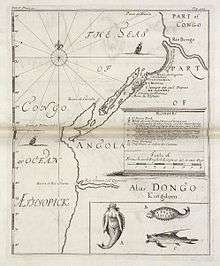Awnsham Churchill
Awnsham Churchill (1658–1728) was an English bookseller and Whig radical, a Member of Parliament in the reign of Queen Anne.
Life
The son of William Churchill of Dorchester, Dorset, and brother of the MPs Joshua Churchill and William Churchill, he was apprenticed to George Sawbridge.[1] With another brother, John, he then entered into business as booksellers and stationers at the sign of the Black Swan in Paternoster Row, London.[2] At the beginning of 1680 he signed a petition to the king asking for the recall of parliament; and in 1682 he published a sermon of Samuel Bold against persecution.[1][3]
In the mid-1680s the Churchill brothers were involved in the opposition to James II of England, visiting Amsterdam and consorting with those supporting Monmouth's Rebellion.[4] He was arrested in 1687 for printing Gaspar Fagel's Letter, which outlined the position on religious toleration of the Prince of Orange.[1]
Churchill was later stationer to William III of England, as the Prince became in 1689, and a leading bookseller of his time. He amassed a fortune, and was able to purchase, in 1704, the manor of Higher Henbury in Dorset from John Morton, and that of West Ringstead from James Huishe in 1723.[2]
Member of Parliament for Dorchester between 1705 and 1710, Churchill was distantly related to the other Dorchester member John Churchill; and also was related to the Duke of Marlborough, but had little to do with him. He was closer to George Churchill, the Duke's brother.[1]
Relationship with John Locke
John Locke met Churchill in Rotterdam.[5] They remained on friendly terms for many years.[2] Churchill was Locke's publisher, and Edward Clarke acted as an intermediary at some point.[6] The Two Treatises of Government and A Letter Concerning Toleration of 1689 were published by Churchill, with other works by Locke.[1]
Churchill also managed money and business for Locke. As Locke was dying in 1704 they parted at High Laver, and Churchill was a trustee for money Locke was leaving to Francis Cudworth Masham, son of Damaris Cudworth Masham.[1]
Death and legacy
Churchill died unmarried on 24 April 1728, and his brother John succeeded to his estate. A library at Henbury was formed by the two brothers.[2]
Publications

The Churchill brothers published in 1695 the edition of William Camden's Britannia by Edmund Gibson, from a manuscript of John Aubrey. A second edition of Gibson's Camden was issued by Awnsham alone in 1722. Their Collection of Voyages and Travels was well known,[7] and was issued to subscribers in 1704. Two more volumes came out in 1732, when the first four volumes were reissued; a "third edition" of the six volumes is dated 1744–6; and another by Thomas Osborne, 1752. A Collection from the Library of the Earl of Oxford, London, T. Osborne, 1745 and 1747, 2 vols, known as the "Harleian Collection", and a similar collection by John Harris (1744–8 as 2 vols.), are often grouped with Churchill's collection, as reprints of voyages and travels. Locke was involved, and it was stated on the title-page of the third edition that the preliminary essay on the history of navigation was attributed to him, which was later questioned; but it was included in Locke's works in 1812.[2]
The brothers also published the first edition of Thomas Rymer's Fœdera (16 vols. 1701–15); the seventeenth volume (1717) was issued by William Churchill, and the last three (1726–1735) by Jacob Tonson.[2]
Notes
- 1 2 3 4 5 6 "Churchill, Awnsham (1658-1728), of the Black Swan, Paternoster Row, London and Henbury, Dorset, History of Parliament Online". Retrieved 7 November 2014.
- 1 2 3 4 5 6
 Stephen, Leslie, ed. (1887). "Churchill, Awnsham". Dictionary of National Biography. 10. London: Smith, Elder & Co.
Stephen, Leslie, ed. (1887). "Churchill, Awnsham". Dictionary of National Biography. 10. London: Smith, Elder & Co. - ↑ Ferris, John. "Bond, Nathaniel". Oxford Dictionary of National Biography (online ed.). Oxford University Press. doi:10.1093/ref:odnb/2830. (Subscription or UK public library membership required.)
- ↑ Richard L. Greaves (1 January 1992). Secrets of the Kingdom: British Radicals from the Popish Plot to the Revolution of 1688-1689. Stanford University Press. p. 302. ISBN 978-0-8047-2052-6.
- ↑ Lois G. Schwoerer (3 June 2004). The Revolution of 1688-89: Changing Perspectives. Cambridge University Press. p. 153 note 22. ISBN 978-0-521-52614-2.
- ↑ Patrick Kelly, A Note on Locke's Pamphlets on Money, Transactions of the Cambridge Bibliographical Society Vol. 5, No. 1 (1969) , pp. 61–73, at p. 62. Published by: Cambridge Bibliographical Society. Stable URL: http://www.jstor.org/stable/41154480
- ↑ A Collection of Voyages and Travels, some now first printed from original MSS., others translated out of foreign languages and now first published in English; in four volumes, with an original preface giving an account of the progress of navigation,' &c., 1704, 4 vols.
Attribution
![]() This article incorporates text from a publication now in the public domain: Stephen, Leslie, ed. (1887). "Churchill, Awnsham". Dictionary of National Biography. 10. London: Smith, Elder & Co.
This article incorporates text from a publication now in the public domain: Stephen, Leslie, ed. (1887). "Churchill, Awnsham". Dictionary of National Biography. 10. London: Smith, Elder & Co.